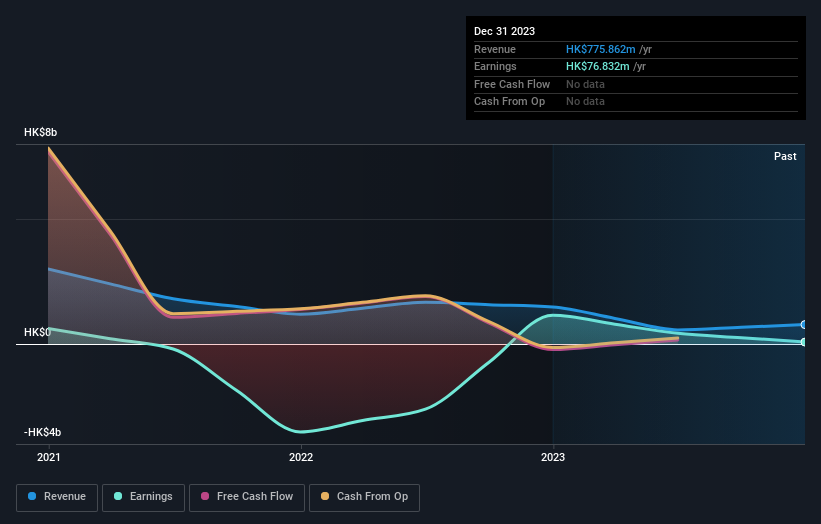Stock Analysis
- Hong Kong
- /
- Real Estate
- /
- SEHK:127
Chinese Estates Holdings Limited's (HKG:127) CEO Hoi-Wan Chan is the most upbeat insider, and their holdings increased by 12% last week

Key Insights
- Significant insider control over Chinese Estates Holdings implies vested interests in company growth
- Hoi-Wan Chan owns 50% of the company
- Using data from company's past performance alongside ownership research, one can better assess the future performance of a company
If you want to know who really controls Chinese Estates Holdings Limited (HKG:127), then you'll have to look at the makeup of its share registry. We can see that individual insiders own the lion's share in the company with 75% ownership. In other words, the group stands to gain the most (or lose the most) from their investment into the company.
Clearly, insiders benefitted the most after the company's market cap rose by HK$267m last week.
Let's delve deeper into each type of owner of Chinese Estates Holdings, beginning with the chart below.
See our latest analysis for Chinese Estates Holdings

What Does The Lack Of Institutional Ownership Tell Us About Chinese Estates Holdings?
Small companies that are not very actively traded often lack institutional investors, but it's less common to see large companies without them.
There are multiple explanations for why institutions don't own a stock. The most common is that the company is too small relative to funds under management, so the institution does not bother to look closely at the company. It is also possible that fund managers don't own the stock because they aren't convinced it will perform well. Chinese Estates Holdings might not have the sort of past performance institutions are looking for, or perhaps they simply have not studied the business closely.

Chinese Estates Holdings is not owned by hedge funds. With a 50% stake, CEO Hoi-Wan Chan is the largest shareholder. This implies that they possess majority interests and have significant control over the company. Investors usually consider it a good sign when the company leadership has such a significant stake, as this is widely perceived to increase the chance that the management will act in the best interests of the company. In comparison, the second and third largest shareholders hold about 25% and 0.4% of the stock.
While it makes sense to study institutional ownership data for a company, it also makes sense to study analyst sentiments to know which way the wind is blowing. We're not picking up on any analyst coverage of the stock at the moment, so the company is unlikely to be widely held.
Insider Ownership Of Chinese Estates Holdings
The definition of an insider can differ slightly between different countries, but members of the board of directors always count. The company management answer to the board and the latter should represent the interests of shareholders. Notably, sometimes top-level managers are on the board themselves.
Most consider insider ownership a positive because it can indicate the board is well aligned with other shareholders. However, on some occasions too much power is concentrated within this group.
Our most recent data indicates that insiders own the majority of Chinese Estates Holdings Limited. This means they can collectively make decisions for the company. That means they own HK$1.8b worth of shares in the HK$2.4b company. That's quite meaningful. Most would be pleased to see the board is investing alongside them. You may wish todiscover (for free) if they have been buying or selling.
General Public Ownership
With a 25% ownership, the general public, mostly comprising of individual investors, have some degree of sway over Chinese Estates Holdings. While this size of ownership may not be enough to sway a policy decision in their favour, they can still make a collective impact on company policies.
Next Steps:
While it is well worth considering the different groups that own a company, there are other factors that are even more important. Be aware that Chinese Estates Holdings is showing 3 warning signs in our investment analysis , and 1 of those is significant...
Of course this may not be the best stock to buy. So take a peek at this free free list of interesting companies.
NB: Figures in this article are calculated using data from the last twelve months, which refer to the 12-month period ending on the last date of the month the financial statement is dated. This may not be consistent with full year annual report figures.
Valuation is complex, but we're helping make it simple.
Find out whether Chinese Estates Holdings is potentially over or undervalued by checking out our comprehensive analysis, which includes fair value estimates, risks and warnings, dividends, insider transactions and financial health.
View the Free AnalysisHave feedback on this article? Concerned about the content? Get in touch with us directly. Alternatively, email editorial-team (at) simplywallst.com.
This article by Simply Wall St is general in nature. We provide commentary based on historical data and analyst forecasts only using an unbiased methodology and our articles are not intended to be financial advice. It does not constitute a recommendation to buy or sell any stock, and does not take account of your objectives, or your financial situation. We aim to bring you long-term focused analysis driven by fundamental data. Note that our analysis may not factor in the latest price-sensitive company announcements or qualitative material. Simply Wall St has no position in any stocks mentioned.
About SEHK:127
Chinese Estates Holdings
Chinese Estates Group (the "Group") is one of the leading property developers in Hong Kong.
Imperfect balance sheet with weak fundamentals.


